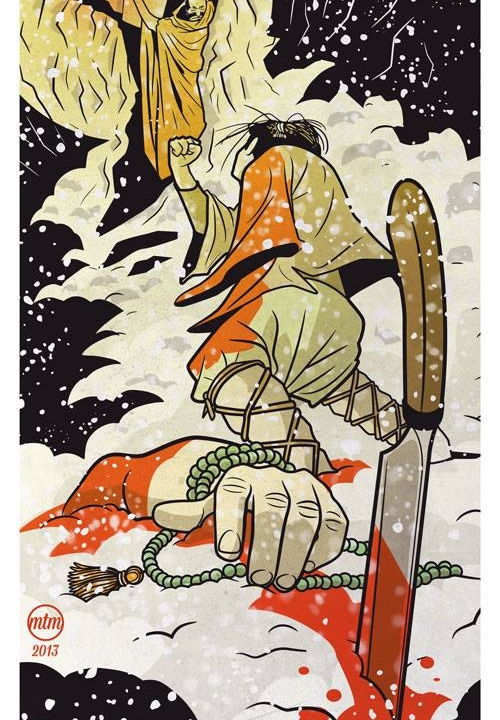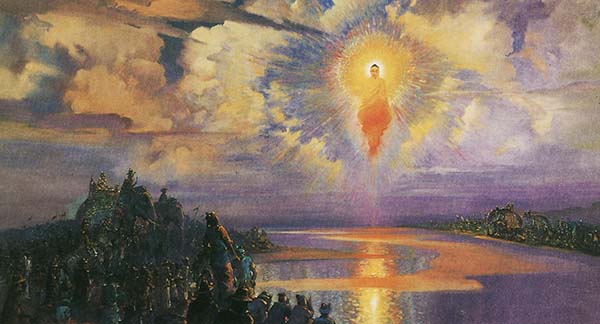Art by Mark Morse
Gateless Gate, Case 41
Bodhidharma sat facing the wall.
The Second Patriarch stood in the snow.
He cut off his arm and presented it to Bodhidharma, crying, “My mind has no peace as yet! I beg you, master, please pacify my mind!”
“Bring your mind here and I will pacify it for you,” replied Bodhidharma.
“I have searched for my mind, and I cannot take hold of it,” said the Second Patriarch.
“Now your mind is pacified,” said Bodhidharma.
Every time I hear this case, my heart rushes out to meet Huike, the Second Ancestor of Zen in China.
Who here hasn’t been in his shoes, turbulent and troubled, at the end of our ropes, desperately searching for someone or something to finally give us peace?
Tradition tells us that Huike had already been studying Buddhism for many years before Bodhidharma came from the West. Some even considered him to be enlightened before this encounter. And maybe he was.
Yet there he stood, waist deep in the snow, begging this grumpy bulge-eyed barbarian to grant him release from his suffering mind.
This world does a number on us all. We’re born with literally everything we need—lungs to take in air, a digestive system to take in nourishment, a heart to circulate blood, and a brain to experience the improbable magic of this infinite Universe.
And yet, if the Buddha’s First Noble Truth, the truth of dukkha, or unsatisfactoriness, is to be believed, not one of us thinks it’s enough. Not one of us thinks we’re enough.
We grab and we snatch, but we can never quite take hold of our sad, searching, unquiet minds to pacify them.
We’re always grasping after that which we think will complete us. And in the most twisted irony ever contrived, as soon as we get the object of our desire, we find that we still feel incomplete. So, enacting the definition of insanity, we do it again, and again, and again, always with the same result.
And sometimes, like Huike, we carve ourselves up in the pursuit of those things we think will make us whole. After all, what’s an arm or a leg, or a piece of our souls when weighed against our deepest desires?
For most of us, hardly a day goes by when we don’t disfigure ourselves in some way—compromising our integrity to get ahead, fit in, gain admiration or wealth, or simply to survive. Or maybe we literally disfigure ourselves through addictions, disorders, or self-abusive, self-destructive behaviors.
We do these things, make these cuts, thinking that, like a wolf in a trap or the man from that 127 Hours movie, doing so will let us finally escape that persistent sense of doubt, shame, and inadequacy always weighing us down in the deepest pit of our bodies, telling us we need to do more, have more, be more.
As shocking as Huike’s act of cutting off his own arm and tossing it into the snow as an offering seems, it’s only what we all do. In a world where body and soul are commodities, brutality is commerce.
This is the tragedy from which Prince Siddhartha sought release when he left his palace to become a wandering mendicant. But even he wasn’t immune from this disease.
Before experiencing awakening, the sutras tell us the future Buddha spent six years subjecting himself to dangerous self-mortification practices, holding his breath until he was on the edge of blacking out, subsisting on a single grain of rice each day until his vertebrae poked out through his hollow belly.
It was only after he’d collapsed and was hanging onto life by a thread—had reached what some in the recovery community would call “rock bottom”—that the Buddha allowed Sujata, a young girl from the village where he’d been meditating, to feed him milk rice and nurse him back to health.
Had he not accepted her ministrations, we might not be sitting here today trying to practice his teachings.
Which is why I find it so perplexing that, in typical macho “Zen crapola” fashion, some people seem to glorify Huike’s action, lionizing this frenzied, distraught man’s horrifying cry for help as a mark of true dedication to practice realization.
I’ve actually heard of contemporary Zen teachers who’ve used this story to make the point that Zen students should be willing to make any necessary sacrifice in the pursuit of awakening.
“Huike cut off his arm to prove his worth,” they say, “and you’re not willing to give up your family vacation to come to sesshin?”
This is nonsense. Not one of us has anything to prove.
Our Bodhisattva vows require us to work to liberate all beings, not just those who want it badly enough to endure our hazing rituals, who want it so badly they try to give pieces of themselves away for the privilege.
Which is why I stand with Ikkyu, the Japanese priest, poet, and profligate in saying, “Don’t wait for the man standing in the snow to cut off his arm. Help him now!”
I hope no one who comes to Treetop in search of peace ever gets the message that they must cut themselves in two for the sake of this practice.
This may sound like a cop-out, like an admission that we practice lightweight Zen here, but it’s not. We’ve already seen that any fool can cut herself in two. At Treetop, we’re challenged to do something much more difficult.
In his commentary on Nansen Kills a Cat, another of the infamously bloody koans in our tradition, Eihei Dogen, the founder of Japanese Soto Zen, wrote, “Cutting into two is easy to see, but cutting into one is invisible even to Setcho.”
(Setcho is the Japanese name for Hsueh Tou, the complier of the Blue Cliff Record, which includes a version of the cat story).
This is the feat we’re tasked with. We must wield Manjushri’s diamond sword to cut ourselves into one. We must cut this suffering world into one, until there is no more body and mind, no more self and other, no more friend and foe, no more how it is and how we wish it would be.
When we cut away all of the divisions, we’re left with just this.
When we cut ourselves into one, we no longer hold back, leaving our bodies to deal with painful reality while we retreat into the wilderness of our minds, hiding out in the shadows of our likes and dislikes, our fears and fantasies, our grudges and gripes, our certainties and our fictions and our second-guessing.
Instead of tossing ourselves away one painful, bloody limb at a time, we can pour our whole selves out in each instant and, like Sujata feeding milk rice to the dying would-be Buddha, heal ourselves and this hurting world with an offering of pure presence.
Bodhidharma sat facing the wall.
The Second Patriarch stood in the snow.
He cut off his arm and presented it to Bodhidharma, crying, “My mind has no peace as yet! I beg you, master, please pacify my mind!”
“Bring your mind here and I will pacify it for you,” replied Bodhidharma.
“I have searched for my mind, and I cannot take hold of it,” said the Second Patriarch.
“Now your mind is pacified,” said Bodhidharma.



